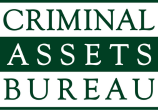Data Protection
The Criminal Assets Bureau (CAB) is committed to protecting the rights and privacy of all individuals in accordance with the EU General Data Protection Regulation, 2016/679 (GDPR) as given further effect in Part 3 of the Data Protection Act 2018.
The Bureau’s Data Protection Policy sets out how CAB secures and manages personal data in accordance with the Principles of GDPR. It can be viewed by clicking on the following link CAB Data Protection Policy. The Policy also explains how you can request access to your personal data.
The Data Protection Officer for the Criminal Assets Bureau can be contacted via [email protected].
Making a Subject Access Request
All Subject Access Requests (SARs) must be submitted to the CAB Data Protection Officer. To submit a request, please complete the Subject Access Request Form (SAR) and send it either by email to [email protected] or by post to:
Criminal Assets Bureau
Walter Scott House
Military Road
Dublin 8, D08 HE2P
Ireland
To help our Data Protection Officer verify your identity and locate your personal data, please include a copy of your driver’s license, passport, or public services card with your request.
Website Privacy Statement
This privacy statement explains how Criminal Assets Bureau collects and uses information about you, based on your visits to this website. You also have a right to obtain personal data about you kept by the Criminal Assets Bureau. This is explained in our Data Protection Policy referenced above.
How we collect and use personal information
Criminal Assets Bureau does not collect any personal data about you on this website, apart from the personal data which you volunteer by sending us an email or completing our online feedback form.
Your personal data, submitted in this way, will be processed in order to respond to your request or otherwise address the subject matter of your mail. It may also be used to compile statistics.
Your personal data will not be used for any other purpose and will not be released to any third party.
Cookies
A cookie is a small text file that may be stored on your computer or mobile device that contains data related to a website you visit. It may allow a website “remember” your actions or preferences over a period of time, or it may contain data related to the function or delivery of the site. Cookies can be set by the owner of the website or in some cases by third party services the website owner allows to present other information, run content or provide other functionality such as analytics. Further information on cookies can be found at: Europa Web Guide – Cookies and Similar Technologies
Cookie usage
The following tables include a list of cookies that can be used on this website. This includes “strictly necessary” which are loaded when the content of the website is loaded. We cannot deliver the website to you without setting these cookies. You can change your cookie preferences by selecting or deselecting the checkboxes accordingly and clicking “Save”. Here is a description of the various cookie categories.
